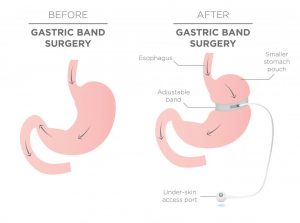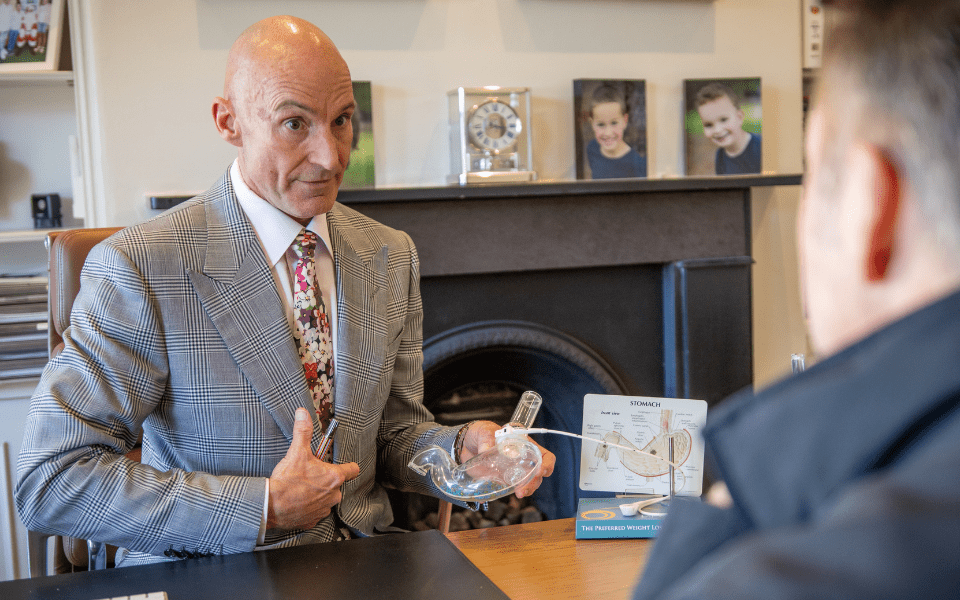
Philosophical optimists are calling it the year of hope. Now in the third year of a pandemic and with worldwide vaccination rates at an acceptable level, everyone is keen to get their lives back on track. This could mean finally making that trip to see distant relatives, looking for your dream job or, finally finding the time to book that life-changing weight loss surgery.
Gastric band surgery continues to gain popularity with weight loss patients. Unlike other bariatric surgeries, it is reversible and far less invasive than surgeries that reduce your stomach size permanently. Gastric bands are also adjustable. This is an important function for patients who may wish to change its intensity as certain life events require. Let’s take a closer look.
What is a gastric band?
Also known as the LAP-BAND® System, this is an adjustable band placed around the top portion of the stomach. It tricks the brain into thinking you are full on a smaller amount of food than what you would have consumed pre-surgery. This type of surgery has been used in weight loss since 1994 and to date, over 850,000 lap-band procedures have been successfully completed globally. Gastric bands are technically reversible and bands can be adjusted through an access port on your abdomen if needed.

What are the risks of gastric band surgery?
Gastric band surgery is considered less invasive and is relatively low risk when compared with other major surgeries. There is no stomach cutting or stapling so your body experiences less trauma and your recovery time will be faster. While there are always risks worth considering with weight loss surgery, morbid obesity also poses a serious risk to your current and future health.
What happens during gastric band surgery?
On the day of your operation, you’ll be put under general anesthetic and your surgeon will make small laparoscopic incisions on the abdomen. The band will be placed around the top part of the stomach. The access port is then placed along the wall of the abdomen before the surgeon closes the incisions with sutures. This access port allows saline to be injected or removed from the band when it is adjusted in future. You will then stay in hospital a further 1 or 2 nights to recover from the surgery and stay under observation.
How much weight will you lose?
It does vary from patient to patient, but it is generally expected you will lose 50% of your excess weight. As to how fast you will lose weight, you’ll likely lose around 0.5 – 1.0 kg per week in the first 12 to 18 months. After that time, further weight loss will be determined by your dedication to a more active and healthier lifestyle. Life-changing weight loss surgery is meant to be gradual and therefore sustainable, so keep in mind that the weight won’t fall off immediately. Losing weight too fast can pose a health risk. Think of this as a long walk rather than a weight loss sprint.
Will you have to change your diet before or after surgery?
Yes. Approximately two weeks preceding your surgery and in the two weeks following surgery, you will have to follow a liquid diet to get your stomach to prepare for and adjust to its new size. After that, you will need to moderate your diet to accommodate the change in your stomach’s ability to process food. This will include planning smaller meals, taking the time to eat and ensuring your food is always well-chewed for easy digestion. If you are worried about having to minimise your food intake, remember that the gastric band will make you feel fuller on less food, so controlling your eating won’t be down to sheer willpower.
What can I eat with a gastric band?
While you don’t have to ‘ban’ certain foods, it is recommended you adopt nutrient-rich and fresh food habits as opposed to the ultra-processed or sugar-laden food you might have consumed previously. The feeling of eating these foods will, in time, become a joy for your mind and body. Thankfully, planning and managing your post-surgery diet won’t be something you do alone. At Winnett Specialist Group, you’ll enter a supportive environment where every aspect of your surgery and post-surgery experience is considered. Your surgery won’t just be an operation but a journey that gives you access to a specialist support network of bariatric dietitians, trainers, clinicians, post-surgery consultants and of course, your dedicated surgeon.
Gastric Band Surgery with Winnett Specialist Group
Winnett Specialist Group wants to help you change your life and markedly improve your overall physical and mental health in the long term. Please call us to speak to one of our friendly team members to arrange an obligation-free consultation on 03 9417 1555 or contact us online.




